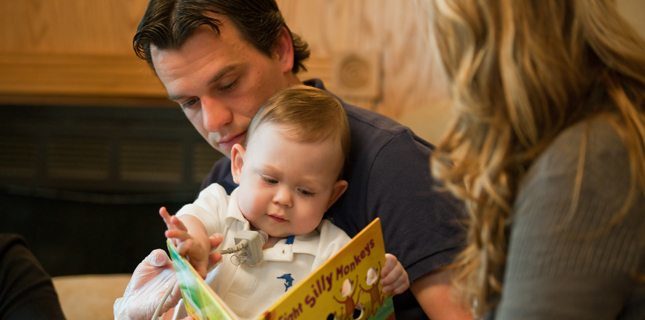Supporting the Family Members of Children with Medical Complexities

When a child has a medical diagnosis, it impacts the entire family. In many instances, it can feel incredibly isolating for the parent, sibling, or even grandparent when it seems that they don’t know anybody else going through a similar experience of hospital stays, doctor visits, or around-the-clock care.
Thankfully, there is a strong community of other caregivers and family members who are walking a similar path. These parents understand the heartache, the triumph, and all the ups and downs that each day can bring – without judgement. Through groups, online forums, and organizations in the community, parents can feel supported and a part of a team that just gets it. Check out some of the support groups we’ve gathered, and add any others we may have missed by including them in the comments.
 The parent
The parent
Family Voices: Parent to parent peer support
- This organization’s entire mission revolves around providing support for families by connecting them with one another based on similar needs or circumstances of a child. With their parent to parent support program, families have shared having an increase confident in caring for their child and a decrease in emergency department visits – two benefits we think every parent can get behind.
- Faith’s Lodge supports parents and families facing the death or medically complex condition of a child. At their lodge tucked away in Danbury, WI weekend retreats offer optional professionally-led discussion groups and activities alongside other families who have faced similar circumstances.
Virtual Support
- Maybe an in-person support group isn’t a realistic option for you due to schedule, your location, or just your personal preference. There are support groups of just about any kind online for parents of children with medical needs – whether you’re looking for a group of mothers or a group specific to your child’s diagnosis. Here are a few we’ve found:
- Mommies of Miracles – a virtual support group dedicated to eliminating the isolation that many mothers of medically complex children feel. Their Facebook page is a space filled with inspiring stories, useful resources, and a discussion group.
- The Global Tracheostomy Collaborative – An international resource related to all things tracheostomy, this organization allows families to become members and gain access to private forums, blogs, education, and more. They also offer a number of Facebook groups to help families connect with one another.
- Complex Child – this resource is a monthly online magazine written by parents of medically complex children, but extends far beyond just articles. You can search the website by topic including support and coping, medical conditions, therapy and education, and more.
- Search for support groups by your child’s condition – there are likely groups, Facebook pages, and forums for parents just like you. With a rare condition, this can be even more helpful since there may not be anybody else nearby that has the same diagnosis.
 The patient
The patient
- Children often have a hard time processing and expressing concerns or frustrations that arise from certain situations they experience, such as traumatic medical procedures or ongoing care. Through play therapy with our clinical social worker, kids can use toys as words to express themselves and work through their feelings.
PACER “For Youth Only” Program
- PACER believes that by helping youth understand their disability and the impact it has on their life, they can better advocate for their needs and understand systems of care. This program helps kids get involved, find resources, and learn how to prepare for adulthood.
 The sibling
The sibling
University of Minnesota Masonic Children’s Hospital Sibshops
- Sibshops is a national organization that provides regular events for young brothers and sisters of children with a disability. University of Minnesota Masonic Children’s Hospital holds a Sibshops event the 2nd Saturday of each month for siblings from Kindergarten-age 12.
- In our support program for brothers and sisters of children with medical complexities, groups of 6 siblings ages 6-11 years old get together for 12 weekly sessions that focus on a theme to help them process their thoughts, work through feelings, and express themselves in a healthy way.
 The grandparent
The grandparent
PACER Center Grandparent Group
- This group recognizes that while grandparents may not always be as integrated into a medically complex child’s day to day cares, they are still impacted by their grandchild’s medical complexities, and the questions that come with them. Through monthly get togethers, grandparents can meet others in similar situations and learn helpful information from one another.
- It can be helpful for adults to talk with a counselor about the emotions and situations they encounter when a child they love has complex medical needs. Through individual therapy with our clinical social worker, parents, grandparents, or even older children can express themselves in a helpful, secure location.


